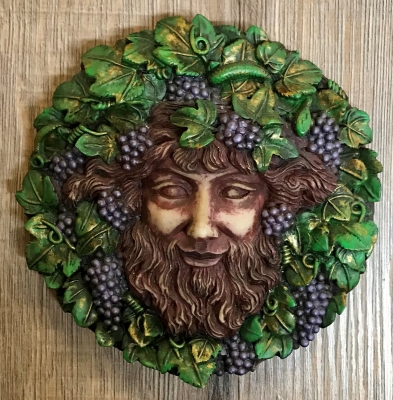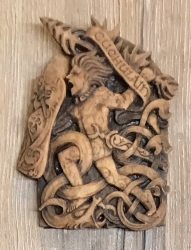Produktbeschreibung
Größe:
Durchmesser ca. 15,2cm
Herstellerinfo:
Bacchus was the Roman name given to the God of Wine and Ecstasy, whom the Greeks knew as Dionysus. He was a latecomer to the Olympic Pantheon and is most often said to be the son of Zeus by the mortal woman Semele. Semele appealed to Zeus to reveal Himself to her in His true form and she was burned up by the glory of His thunder and lightning. Zeus took the child into his own body, later giving birth to Him through His thigh. This is a later account, however, for Dionysos was one of the old, wild agricultural Gods of Thrace and Phrygia. His mother, Semele, is associated with the Phrygian Earth Goddess Zemelo.
Though He is credited with discovering grapes and the art of winemaking, Dionysus was the God of more than Wine. He is the god of the wilds not the wilds of visible nature where Artemis reigns, but the wilds that extend so far and smile so deep in the secret regions of the human personality. Within the heart of the worship of Dionysus lies the recognition of humanity's need for occasional release from the bonds of custom and respectability. He represents a permanent human force; and yet a force that every age and culture seeks, if not to suppress, to channel and contain. This urge to "let oneself go" is no bad thing, so long as we are aware of it; but to resist and deny Dionysus and the wild side is to reject joy and often such a rejection incurs sad consequences. So many of the stories of Dionysus are about how various people denied His Godhood and met an unhappy Fate.
However, one of the most beautiful and touching romances of all times is the tale of Dionysus and Ariadne. Ariadne was a beautiful Cretan Princess who had abandoned her homeland to run away with the Greek hero, Theseus. Theseus tired of her and abandoned her on the island of Naxos. In despair she flung herself into the sea but was rescued by Dionysus. They fell in love and He made her His Priestess. When she finally died, He flung the crown He had given her into the heavens where it remains as the constellation Corona. This story formed part the Dionysian Mysteries as they were performed in the Roman town of Pompeii.
The rites of Dionysus were introduced into Athens by Peisistratus in the mid-6th Century BCE. His temple was built at the Acropolis and His priests and priestesses were accompanied by masked performers of the God's stories who were called tragodoi (literally "goat singers") and this was the origin of Greek Tragedy and thus of Western Theatre. Dionysian masks were often used as antefixes on the walls of temples.
Material: Kunstharz/ Polyresin
Stichworte:
Mythic Images Thea Genesis Götter Göttinen Heidentum Pagan Statuen Wicca Kelten Gods Goddesses statues OBOD PFI Pagan Federation Dekoration
Diesen Artikel haben wir am 13.12.2010 in unseren Katalog aufgenommen.


